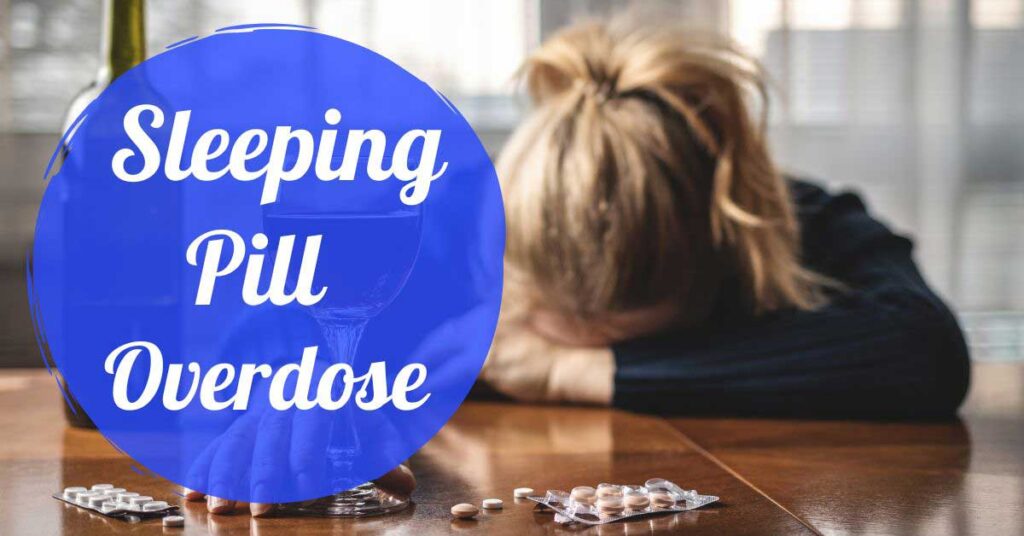Sleeping pills are a type of medicine that can help you sleep. Insomniacs use these pills to help them sleep. If you have trouble falling asleep at night or waking up during the day, sleeping pills may help. It is also known as Hypnotics (sedatives), Sedatives (sedatives), and Tranquilizers (tranquilizers).
Sleeping pills are more common for people who have insomnia. However, prescriptions are better than taking sleeping pills. There are many reasons why people use sleeping pill overdose.
Stress is the main reason people have insomnia. It is possible to fall asleep if the brain is relaxed. Sleeping pills directly affect the central nervous system of the body, which consists mainly comprises the brain. The pills will calm your muscles and improve your body’s functions.
Why Do Some Have Sleep Issues?
Table of Contents
Your doctor may recommend a sleeping pill if you have had trouble sleeping. People have different reasons for sleeping difficulties. These are some of the common reasons why people have trouble sleeping:
- Stress
- Anxiety
- Depression
- Chronic pain
- Light exposure at night
- Shift work
- Alcohol consumption
Why Do People Begin Using Sleep Aids?
If you have insomnia or severe sleep disorders like snoring, taking sleeping pills can help. Stress, diet, family/genetics, and physical pain are all factors that can lead to chronic sleeplessness. Although natural remedies can be helpful, some people may require more. Sedative medications may be prescribed to patients who consistently have trouble getting good sleep.
How Do I Get Back My Sleep From An Overdose?
Notify 911 immediately if it appears that you have consumed sleeping pill overdose. If you are admitted to the hospital, activated carbon will be administered to your body to absorb the overdose. They may also recommend other treatments, such as fluids or medications, to help your heart beat more regularly.
Some sleeping pills can be mixed in with other substances. Some people mix sleeping tablets with alcohol. This can cause an overdose and be extremely dangerous.
Sleeping Pills Overdose Symptoms
Most sleeping pills, including sedatives, are taken in tiny doses to avoid overdose. If someone takes too many, it can lead to serious, even fatal, side effects. Sedatives and Hypnotics slow down vital body functions, so a sleeping pill overdose can stop vital organs from functioning altogether.
People may not realize they have taken too much because they may seem deeply asleep. There are some signs that you need to be alert for.
A sleeping pill overdose can cause the following symptoms:
- Extreme Lethargy. Prescription sleeping pills often cause unnatural sedation. The right dose can make you sleepy, but it’s dangerous when you take too many. A person who suddenly is unable or unable to function due to taking sleeping pills may have taken an overdose.
- Trouble Breathing. While breathing naturally slows down during sleep, there should not be any reason to make breathing difficult. Pay attention to your irregular or prolonged breathing.
- Unresponsiveness. when someone who takes sleeping pills cannot be woken from their sleep, it is possible that their life could be in danger.
How Do Sleep Aid Pills Function?
The effect of sleeping pills on sleep can vary depending on the medication used. Melatonin is one of many ingredients that cause sleep. Instead, it regulates the sleep-wake rhythm. It rises naturally at night, signaling to your body it’s time to sleep.
By reducing the stress hormone cortisol and slowing down respiration, a melatonin-based supplement will prepare the body for sleep. Antihistamines act by blocking the body’s Histamine receptors. Antihistamines are effective in reducing wakefulness caused by histamine stimulation. They also cause immediate sedation by blocking these receptors.
Benzodiazepines bind to GABA receptors in the brain. They slow down brain activity and induce a calming, sedating effect. Valerian root also has GABA receptor binding. Valerian root also influences a neurotransmitter called serotonin within the brain, which regulates moods and sleep.
How Long Does The Sleeping Pill Take To Work?
Most prescription sleeping tablets work within half an hour. These medications have been approved by the FDA for sleep aid and have been extensively studied.
- Eszopiclone’s (Lunesta’s) onset occurs in 30 minutes. It lasts for 8 hours.
- Zaleplon’s (Sonata’s) onset occurs in 30 minutes. It lasts for 4 hours.
- The onset of Zolpidem (Ambien Edluar Intermezzos) is within 20-30 minutes.
- Suvorexant (Belsomra’s) onset takes less than 30 seconds and lasts seven hours.
- Ramelteon’s Rozerem (Rozerem ) can reach peak levels within 45 minutes.
Prescription medication called benzodiazepines might also be used for sleep. These prescription medications can work quickly.
Melatonin (an over–the–counter sleep aid) is a synthetic hormone. It kicks in within thirty minutes and lasts four to eight hours.
Some prescription medications may be prescribed off-label to help with sleep. Because of this, they are less researched regarding the precise timing of their effects.
- Doxepin
- Gabapentin
- Mirtazapine
- Ramelteon
- Trazodone
What Comes If I Take Too Several Sleep Aids Unknowingly?
Too many celebrities have died from sleeping pills mixed in with other substances. Jimi Hendrix and Michael Jackson are just two examples. The term “overdose of sleeping pills” is frequently used to refer to a fatal overdose. Sleeping pill overdose is possible due to the dangers of sleeping pills.
A strong sedative is often used to induce sleep. However, excessive use can lead to undesirable side effects. These side effects can vary depending on what pill you are taking, but they could include the following:
- Tiredness and prolonged lethargy
- Clumsiness, muscle twitching, and uncontrollable trembling
- Sleepwalking
- Memory loss
- Abdominal pain
- Irregular breathing can include slowed and stopped breathing.
These effects can be magnified when combined with alcohol. This is especially true when it comes to respiratory problems. It can also lead to death by overdose.
Addiction to Sleeping Pills
It is no surprise that sleeping pills have become so popular and repeatedly used in the U.S., where 25% of adults report being unhappy with their sleep. Repetitive or long-term use can lead to a sleeping drug addiction.
A severe addiction can result from continued use. Although a minor sleeping pill addiction started as a choice, it can quickly become an out-of-control habit.
Signs and Symptoms of Addiction
The following symptoms may indicate a person with a sleeping pill problem:
- The inability to sleep without a prescription or abuse of the medication
- Failure or inability to cut down on or stop taking the medication.
- Sleep aids can be used for purposes other than sleep, such as treating anxiety or feeling high.
- Tolerating the drug (using more)
- I am feeling withdrawal symptoms while trying to stop using them.
- Combining sleeping pills with other drugs, alcohol, or medications can lead to sleep problems.
- Avoiding or lying down when using sleep aids
- Side effects can occur in the days following.
- Doctor shopping; obtaining prescriptions from more than 1 doctor
Over time, a person may become less responsive to sleeping pills and more dependent on them. An attempt to get enough sleep can quickly become desperate. It’s possible for a person to take too many pills or even more than usual.
It is possible for people who take sleeping pills to switch from injecting them orally to orally. This makes them vulnerable as they could miscalculate their dosage. These factors can often lead to accidental overdoses.
Emergent Treatment
Persons who sleeping pill overdose should be admitted to the hospital. They are usually kept in intensive medical care. After admission, approximately one in four overdose deaths occurs.
You or someone you love is suffering from a sleep pill addiction. Call a treatment center today to learn how to detoxify and recover safely. These are the treatment options for sleeping pill addiction:
- Inpatient detox
- Inpatient treatment
- Outpatient treatment
- 12-step meetings
1. Inpatient Detox
Another option for you is to receive 24-hour care and support while you are recovering from addiction in inpatient treatment.
2. Inpatient Treatment
Dependent on the severity of your case, inpatient care can last from 30-90 days. You will stay in a treatment center and receive support and care from addiction professionals. Most inpatient treatment includes CBT and group psychotherapy to address the root causes.
3. Outpatient Treatment
Outpatient therapy is a less intensive treatment that can still offer you the tools and support to help you recover. Outpatient treatment might be an option if you aren’t ready to commit to inpatient therapy or your addiction isn’t as severe. This is a way to continue living at home and attending therapy sessions.

Frequently Ask Questions
Can Sleeping Pills Increase the Risk of Death?
Sometimes, even if you are not receiving severe treatment, sleeping pills late or improperly can also cause death. It is possible to reduce your death rate by not taking sleeping pills. Experts agree that it is better to look for alternative sleeping methods than pills.
Can You Die From Sleeping Pills?
This is more common when too many pills are taken at once or combined with other medications or alcohol. Adult poisoning was the second most frequent medication that caused sleep apnea in 2019.
Are There More People Likely To Get Overdosed Or Die From Sleeping Pills?
People who abuse sleeping pills are most at risk of overdosing or dying from them. People prone to overdose include those with a history of substance abuse or mental disorders. Also, those who take sleeping pills regularly are at greater risk of overdose.
What Safe and Effective Sleep Aid Alternatives Exist?
People turn to sleep tablets when they have severe insomnia. People with sleeping pill overdose are more likely to be prescribed sleeping pills by doctors. However, many other treatment options are available for those with milder problems. Here are some tips and tricks from the American Academy of Sleep Medicine to improve your sleep.
Be good at sleeping hygiene. Avoid stimulants before bed. Get outside every day. Exercise regularly.
- Meditation is an excellent practice
- Take individual counseling/therapy
- You should have a regular bedtime
- Maintain a healthy diet
- Cut back on caffeine
- Do something relaxing before bed
- Practice stress management techniques
- Before you go to sleep, take a warm bath and shower
- Screen time should be avoided within an hour of bedtime


